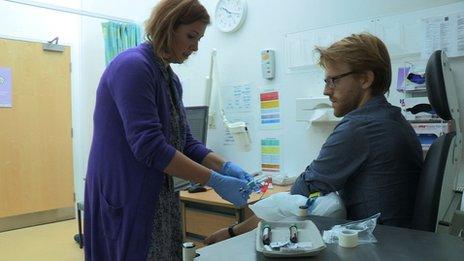Ebola crisis: Vaccine 'too late' for outbreak
- Published
Dr Ripley Ballou, GSK: "It normally takes 7 to 10 years to develop a vaccine"
UK pharmaceuticals firm GlaxoSmithKline says its Ebola vaccine will "come too late" for the current epidemic.
GSK is one of several companies trying to fast-track a vaccine to prevent the spread of Ebola in West Africa.
But Dr Ripley Ballou, head of GSK's Ebola vaccine research, said full data on its safety and efficacy would not be ready until late 2015.
The World Health Organization (WHO) says more than 9,000 people have been infected and more than 4,500 have died.
Health workers are struggling to contain the spread of the virus, which is mostly affecting people in Liberia, Guinea and Sierra Leone.
The WHO has warned there could soon be 10,000 new cases a week.
Leading experts who have previously tackled Ebola believe the only way to contain the outbreak is with a vaccine.
Several trials
Prof Peter Piot, director of the London School of Hygiene and Tropical Medicine, first discovered Ebola in 1976. He is worried that the outbreak could last well into next year.
"Then only a vaccine can stop it, but we still have to prove that this vaccine protects, we don't know that for sure," he said

Nick Owen is taking part in the UK vaccine trial
There are several vaccine trials under way. The Public Health Agency in Canada has started human testing, and a Russian project is planning to do the same.
At GSK's vaccine research laboratories outside Brussels, they are trying to compress trials that would normally take up to 10 years into just 12 months.
They have already given the vaccine to volunteers taking part in the trial in Africa, the US - where they are working alongside the National Institute of Health - and the UK.
'Small sacrifice'
Volunteer Nick Owen was injected two weeks ago at the centre for Vaccinology and Tropical Medicine in Oxford and will have regular check-ups for the next six months.
He said he had not hesitated to take part.
"It's a horrific disease, it's unimaginable what people are going through and it seemed like a really small sacrifice to make," he said.
In the next phase of the trial, the company hopes it will have 20,000 doses ready to be tested by health workers early next year.
When the outbreak was first declared in March, GSK had discussions with the World Health Organization about accelerating the development of the Ebola vaccine, Dr Ballou said. But they had decided, together, not to.
"No-one anticipated we would need a vaccine," said Dr Ballou. "And so both internally and, I think at the WHO, we felt the best approach was to watch very closely".
Seven months on, with the virus out of control, he now concedes: "I think in retrospect we should have pulled that trigger earlier.
"But, you know, it is what it is and we are working very closely with WHO.
"There shouldn't be any finger pointing around this."
Dr Ballou said it would now take some time to assess all of the data to establish the correct dosage and for how long the vaccine was effective. He said that could not be done in time for this latest epidemic.
"At the same time we have to be able to manufacture the vaccine at doses that would be consistent with general use, and that's going to take well into 2016 to be able to do that," he added.
"I don't think this can be seen as the primary answer to this particular outbreak," he said, but the trials under way could help in the future.
"If it does work then to be able to be prepared so that we don't have to go through this again in five years, or whenever the next epidemic is going to break out."
Even if GSK's vaccine does not work, other Ebola vaccines being developed by researchers in Canada and Japan could provide hope for future outbreaks.
Listen to File on Four on BBC Radio 4 on 21 October at 20.00 BST or later on iPlayer.